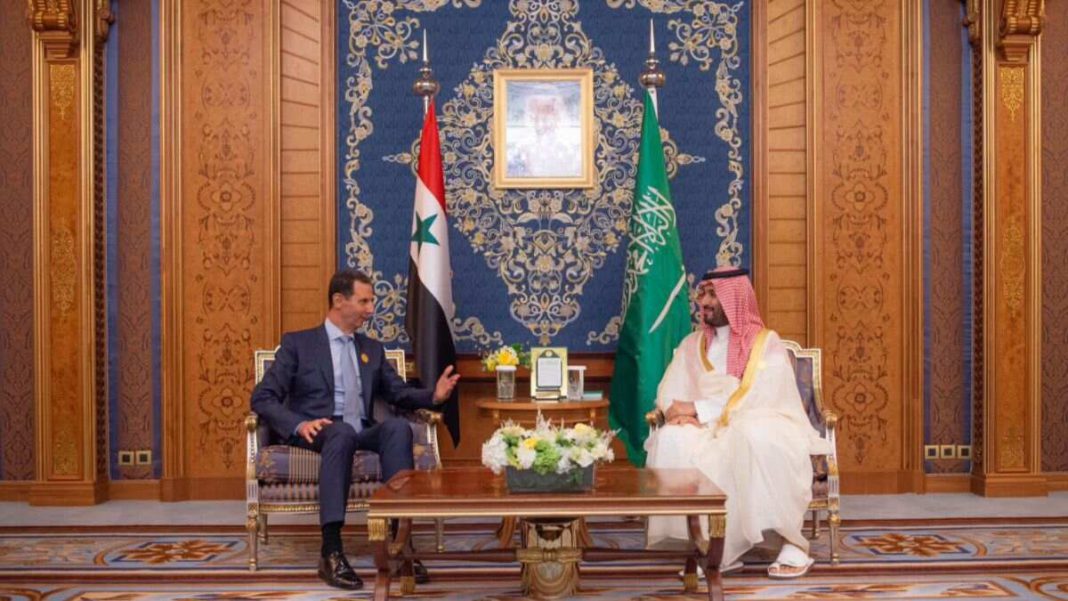LEBANON: Bashar al-Assad, the Syrian president, strode into the Arab League gathering in Jeddah, relishing the clearest acknowledgement yet that he had won his battle for Syria.
Crown Prince Mohammed bin Salman of Saudi Arabia embraced him. The Saudis funded anti-Assad militias ten years ago. Now that the prince, often known as MBS, intends to reshape the Middle East, he needs Syria on board.
President Assad stressed during a speech that Syria would always be an Arab country. However, foreign nations shouldn’t meddle with domestic affairs. “It is important to leave internal affairs to the country’s people, as they are best able to manage them,” he stated.
By the people, President Assad intended to address the leaders as well as the general populace. At the summit, the princes and presidents have collectively imprisoned thousands of their rivals.
Events in Jeddah are being regarded with dismay by Syrians, who accuse the Assad regime of destroying their nation, including all the Syrian refugees in Lebanon.
Small and impoverished Lebanon has had to put up with the influx of well over a million Syrian refugees. That would be the same as the UK taking in nearly 15 million refugees, or over a fifth of the Lebanese population.
Now that many Lebanese have had enough, they are using Syrians as a convenient scapegoat for their own nation’s ongoing political and economic issues.
In recent weeks, the army has forcibly returned about 1,500 of them across the border, frequently leaving children in Lebanon behind or forcing young people out without their parents.
A refugee family who spoke on the condition that their identities be kept private described life in a town close to Beirut where Syrians are subject to a curfew.
The kids have been expelled from school. The turbulence in their lives is evident in the distressing artwork produced by their teenage daughter. Their father is both terrified and disdainful of the embrace of Bashar al-Assad by autocratic Arab leaders.
“The Assad regime is a dictatorship, the same as the other Arab regimes. They’re helping each other and cooperating against the people,” said the refugee family.
The Assad regime and Syria remain under US and European sanctions. The human rights organisation Amnesty International claimed that the president had “turned Syria into a slaughterhouse.”
Amnesty said that the UK government “strenuously opposes any attempt to bolster Assad’s international standing.”
The Arab League has several members who concur. Qatar, which also provides funding for Syria’s armed opposition, disapproves of Assad’s slow ascent to respectability among Arab nations.
However, there are other reasons for Saudi Arabia and the United Arab Emirates (UAE) to desire to court Assad in addition to their larger geopolitical strategies. They believe that the Assad regime is a Middle Eastern reality and that Syria is a nation they need to influence.
Jordan and Saudi Arabia are battling the spread of Captagon, a narcotic opioid produced in Syria and smuggled into their nations. It’s an amphetamine that was once administered to combatants to increase their stamina but is now frequently taken recreationally.
Sanctions have been put in place by the US and UK against specific Assad family members who they claim are deeply involved in the captagon trade. Some estimates place the company’s annual value at around $50 billion ($40 billion).
At the UN, which oversees a sizable aid effort in Syria and Lebanon, there is cautious optimism that Syria’s readmission to the Arab League might somehow serve as a circuit breaker that permits diplomatic progress.
Imran Riza, the deputy special coordinator for Lebanon at the UN, made an effort to see the bright side. He added,“If what’s happening right now in the region is going to help us get to a political solution, then it’s a good thing.”
The UN, however, opposes forcible repatriation. It asserts that Syrian refugees cannot go back until their nation is secure. That is quite a way off. President Assad broke his nation in order to save his regime. His victims have not received justice.
Also Read: Iran Likely to Put 3 Demonstrators to Death for Killing Police Personnel



